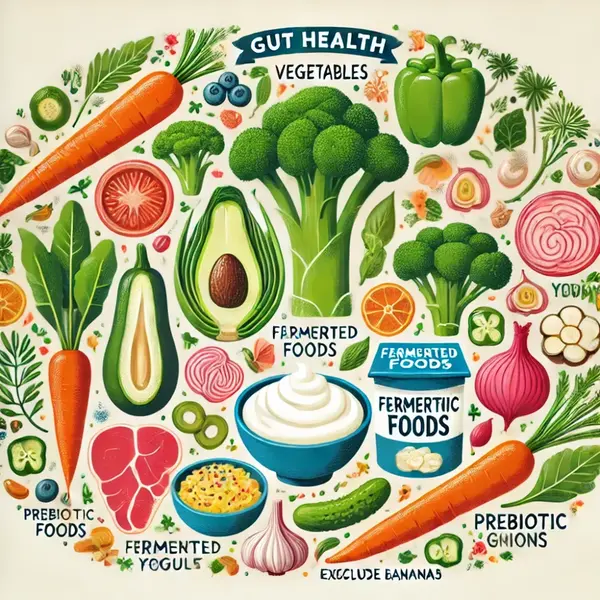Happy Gut, Healthy You: A Guide to Nurturing Digestive Health
In Part 1, we explored the science behind your gut and its critical role in your overall wellbeing. Now it’s time to shift gears and talk about actionable steps you can take to nurture your gut health. A healthy gut doesn’t require a complete life overhaul—small, consistent changes can make a big difference.
A Personal Experience: My Gut and Mental Health Journey
A few years ago, I struggled with depression and had no idea how much my gut health was contributing to it. My diet was full of sugar and processed foods—quick fixes that left me feeling worse over time. Back then, I didn’t understand the connection between my gut and mental health, but looking back, the signs were clear. Poor nutrition was fueling not just physical discomfort, but also emotional struggles. It wasn’t until I started making small changes to improve my gut health that I noticed a shift—not only in my digestion but also in my mood and overall outlook. This journey taught me how critical it is to treat your gut as an ally, not an afterthought.
Friends and Enemies of Your Gut
Your gut is home to billions of microorganisms, and how you treat them determines whether they act as friends or enemies. Feed your gut the right way, and these microorganisms become your greatest allies, supporting your digestion, immunity, and even mood. But neglect them, and they can turn against you, causing inflammation, discomfort, or worse. Let’s explore how to keep your gut friends thriving while keeping the enemies at bay.
1. Feed Your Gut Bacteria What They Need
Think of your gut as a bustling city of microorganisms, and the food you eat as their primary fuel. When you choose the right foods, you nourish your microbiome and encourage the growth of beneficial bacteria.
- Fiber Is Your Gut's Best Friend: Fiber-rich foods like whole grains, vegetables, fruits, nuts, and seeds act as prebiotics, feeding the good bacteria in your gut.
🌱 Pro tip: Start with small portions if you’re not used to a high-fiber diet to avoid bloating. Gradually increase your intake to give your gut time to adjust.
- Fermented Foods Are Key Players: Foods like yogurt, kefir, sauerkraut, kimchi, and miso are rich in probiotics—live bacteria that enhance gut health. These foods help replenish your microbiome, especially after antibiotics.
- Variety Matters: Think of your diet as a garden. The more variety you introduce, the more resilient and diverse your microbiome becomes. Include a rainbow of plant-based foods in your meals for maximum benefit.

2. Minimize Sugar and Processed Foods
Too much sugar and processed food disrupt the delicate balance of your microbiome, allowing harmful bacteria and yeast to thrive. This imbalance, known as dysbiosis, can lead to bloating, inflammation, and even mental fog.
- In Feast, Fast, and Conquer, I introduced strategies like time-restricted eating to reduce sugar cravings and enhance insulin sensitivity—both of which benefit gut health. Consider pairing fasting windows with meals rich in fiber and healthy fats to avoid sugar spikes.
3. Hydration Is Essential
Drinking enough water is vital for keeping your digestive system running smoothly. Water aids in breaking down food and helps transport nutrients through your gut lining.
✨ Tip: Carry a reusable water bottle and aim for at least 2 liters daily. Add a slice of lemon or cucumber for flavor, making hydration more enjoyable.
4. Exercise for a Happier Gut
Regular physical activity doesn’t just benefit your muscles and heart—it also positively impacts your microbiome. Exercise increases the diversity of gut bacteria, reduces inflammation, and improves the overall health of your digestive system.
- Start Small: If you’re new to exercise, begin with a 20-minute daily walk. Over time, incorporate strength training or yoga.
- Consistency Is Key: In Mastering the Metrics, I discussed setting SMART goals. Applying this principle to exercise ensures steady progress that supports both your fitness and gut health.
5. Manage Stress Effectively
Chronic stress wreaks havoc on your gut, disrupting the gut-brain axis and leading to digestive discomfort. Stress management isn’t just good for your mental health—it’s essential for your gut health.
- Relaxation Techniques: Practices like meditation, yoga, and autogenic training help calm your mind and soothe your digestive system. I personally relied on autogenic training 35 years ago to manage stress—long before I understood its impact on my gut.
- Mindful Eating: Slowing down during meals allows your body to fully engage its digestive processes. Chew thoroughly and savor your food.
6. Supplement When Necessary
While food should be your primary source of nutrients, certain supplements can fill gaps in your diet:
- Probiotics: Look for a high-quality supplement with diverse strains, especially after illness or antibiotics.
- Prebiotics: Foods like garlic, onions, and bananas contain natural prebiotics, but supplements can help if your diet is lacking.
7. Sleep for a Healthy Gut
Sleep and gut health are deeply connected. Poor sleep can disrupt your microbiome, while an imbalanced microbiome can make quality sleep harder to achieve.
- Establish a Routine: Go to bed and wake up at the same time daily.
- Create a Restful Environment: Limit screen time before bed and consider mindfulness exercises to relax.
Your Gut, Your Journey
Taking care of your gut is about building a foundation for long-term health. By feeding your microbiome, reducing stress, staying hydrated, and moving your body, you’re setting yourself up for a happier, healthier life.
In the next part of this series, we’ll dive deeper into specific recipes and foods that will not only nourish your gut but also satisfy your taste buds. Stay tuned!